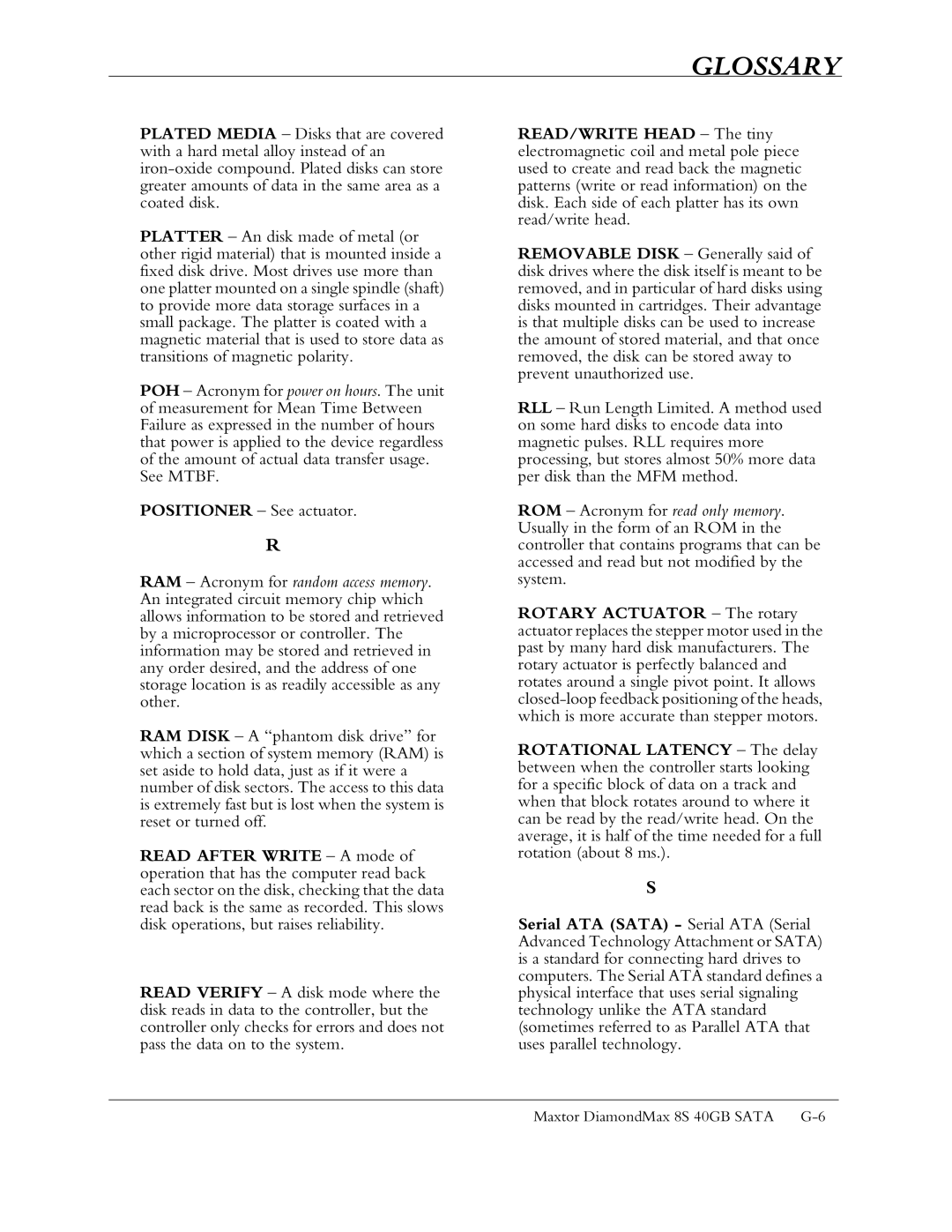
GLOSSARY
PLATED MEDIA – Disks that are covered with a hard metal alloy instead of an
PLATTER – An disk made of metal (or other rigid material) that is mounted inside a fixed disk drive. Most drives use more than one platter mounted on a single spindle (shaft) to provide more data storage surfaces in a small package. The platter is coated with a magnetic material that is used to store data as transitions of magnetic polarity.
POH – Acronym for power on hours. The unit of measurement for Mean Time Between Failure as expressed in the number of hours that power is applied to the device regardless of the amount of actual data transfer usage. See MTBF.
POSITIONER – See actuator.
R
RAM – Acronym for random access memory. An integrated circuit memory chip which allows information to be stored and retrieved by a microprocessor or controller. The information may be stored and retrieved in any order desired, and the address of one storage location is as readily accessible as any other.
RAM DISK – A “phantom disk drive” for which a section of system memory (RAM) is set aside to hold data, just as if it were a number of disk sectors. The access to this data is extremely fast but is lost when the system is reset or turned off.
READ AFTER WRITE – A mode of operation that has the computer read back each sector on the disk, checking that the data read back is the same as recorded. This slows disk operations, but raises reliability.
READ VERIFY – A disk mode where the disk reads in data to the controller, but the controller only checks for errors and does not pass the data on to the system.
READ/WRITE HEAD – The tiny electromagnetic coil and metal pole piece used to create and read back the magnetic patterns (write or read information) on the disk. Each side of each platter has its own read/write head.
REMOVABLE DISK – Generally said of disk drives where the disk itself is meant to be removed, and in particular of hard disks using disks mounted in cartridges. Their advantage is that multiple disks can be used to increase the amount of stored material, and that once removed, the disk can be stored away to prevent unauthorized use.
RLL – Run Length Limited. A method used on some hard disks to encode data into magnetic pulses. RLL requires more processing, but stores almost 50% more data per disk than the MFM method.
ROM – Acronym for read only memory. Usually in the form of an ROM in the controller that contains programs that can be accessed and read but not modified by the system.
ROTARY ACTUATOR – The rotary actuator replaces the stepper motor used in the past by many hard disk manufacturers. The rotary actuator is perfectly balanced and rotates around a single pivot point. It allows
ROTATIONAL LATENCY – The delay between when the controller starts looking for a specific block of data on a track and when that block rotates around to where it can be read by the read/write head. On the average, it is half of the time needed for a full rotation (about 8 ms.).
S
Serial ATA (SATA) - Serial ATA (Serial Advanced Technology Attachment or SATA) is a standard for connecting hard drives to computers. The Serial ATA standard defines a physical interface that uses serial signaling technology unlike the ATA standard (sometimes referred to as Parallel ATA that uses parallel technology.
